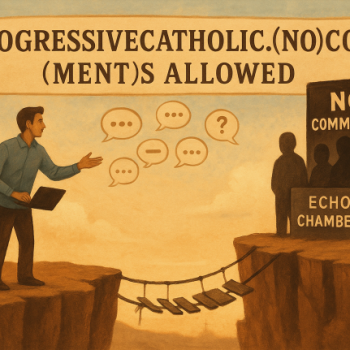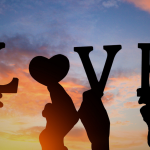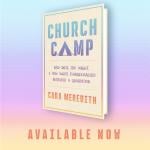GODSTUFF:
PASSOVER COMEDY MIXES FAITH, FAMILY AND FOOD
Tra-di-tion, tradition.
Tradition!
Family rituals are as complicated as they are idiosyncratic, aren’t they?
Like how my family can’t officially start Thanksgiving dinner until someone’s dislodged the scary, gelatinous log of tinned cranberry “sauce” (preferably with the ridges from the can still visible) onto a saucer, even though no one eats it.
Or how my husband’s family will play this toss-the-bean-bag-through-the-hole-in-the-box game on the front lawn for hours — HOURS! — at any and all gatherings.
And how our family watches “National Lampoon’s Christmas Vacation” after Christmas dinner, always pausing at the part where Randy Quaid winds up before he kicks kidnapped, pajama-clad Brian Doyle-Murray in the butt as they approach the Griswold family’s front door, to rewind. Twice.
It’s tradition.
It’s what we do.
It’s part of our story.
I was thinking about tradition and family and stories this week as I watched a sneak preview of the new movie, “When Do We Eat?” It’s a classic holiday comedy — in the vein of “Home for the Holidays” and “Christmas Vacation” — but set around the Seder table at Ira and Peggy Stuckman’s tony suburban home during Passover.
Like “Home for the Holidays” and “Christmas Vacation,” “When Do We Eat?” is both totally charming and terribly cliche. And that’s why I loved it.
It’s a foolproof story line: dysfunctional family members begrudgingly assemble at the homestead for said holiday meal where fights, reconciliations, confessions and hilarity ensue. Just substitute a spit-roasted lamb for a stuffed turkey, and matzo-ball soup for mashed potatoes, add an eccentric grandparent (in this case played to perfection by Jack Klugman), a gay sibling, a family secret, a tab of acid-laced Ecstasy, a stranger with an eye patch, and bingo!
Movie gold, the kind of comfortingly familiar story you’ll watch every year, without fail, and back up to the part where Ira Stuckman (Michael Lerner) takes the Seder plate and . . . well, I don’t want to give it away. It’s not so much kosher, that’s all I’m sayin’.
But the thing is, Passover isn’t Thanksgiving. Its back story is far more profound.
That’s what made “When Do We Eat?” magical, in its way.
Passover is next week.
So I’m battling my annual case of Judeo-envy.
It’s my tradition.
Even though I’m not Jewish (though some of my best friends are) it’s my favorite holiday. All struggle and deliverance, redemption and remembering. Reciting the stories, praying the prayers, talking about hope for the future, giving thanks for the past.
For those of you who are unfamiliar with Passover, or Pesach, here’s the 10-cent version: It’s an annual eight-day festival that celebrates how God delivered the Israelites out of slavery in Egypt.
The Seder is a special dinner held traditionally on the first two nights of Passover where the story of the Israelites’ exodus from Egypt is retold using the Haggadah, a special text that is read aloud during the meal by different members of the family (blood or chosen) around the table.
There’s a lot more to it than that, of course, but that’s the Judaism 101 version, and you get the picture. Long meal, long stories, lots of wine and prayers.
I’m often envious of Judaism’s rituals, its history, the shared culture, the sense of humor.
And the stories.
Of oppression and survival.
Of sorrows and joys.
Of hatred and love.
It’s not that Christianity doesn’t have wonderful stories about the same kinds of things (many of them the same stories, in fact.) For Christians, it’s just . . . different. We’re not a people, not a family in the same visceral way.
Six or seven years ago, I attended my first Seder. A colleague invited my husband and me to her parents’ home in Skokie. We were made to feel part of the family that night as we read the story of the exodus, asked questions, debated the answers, drank wine and ate a lot of food.
There were arguments about reading the Haggadah too fast or too slowly, which parts to skip, which parts to linger over. But what I remember best and most fondly about my first Seder are the family stories told along with the story of the Israelites. Contemporary stories of struggles, deliverance and redemption. Their stories.
My friend’s father passed away the next year. I cherish that Passover. I can still taste the gefilte fish and the kishka, still hear the family praying together in Hebrew, and their laughter.
“When Do We Eat?” reminded me of how important it is (or should be) for families to tell and retell their stories. To remember where we’ve been, what God has brought us through — big and small, good and bad.
It made me laugh and almost cry. It also made me hungry and homesick.
And I think from now on, it may be part of my Passover tradition.
“When Do We Eat?” opened Friday, April 7 in limited release. For theaters and showtimes nationally, click HERE
Copyright © The Sun-Times Company
All rights reserved. This material may not be published, broadcast, rewritten, or redistributed.















